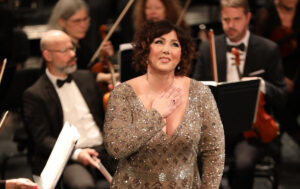Photo: A. Nabo de Sousa, Opéra de Tours
“The silhouette sheathed either in a pink sheath with sequins or clouded with white lace after the intermission, Jennifer Rowley is the great triumphant of the evening and the artist for whom the Touraine public has spared the least applause, regularly punctuating her interpretations with “Brava“.
It is first of all the opulence and volume of the timbre that seduces and impresses. Accustomed to projecting her instrument into the immensity of the Metropolitan Opera in New York, the American soprano only uses a bit of the acoustics of the Grand-Théâtre de Tours in the first words of Tosca’s prayer, “Vissi d’arte, vissi d’amore“, which are sung sotto-voce, and immediately seize the spectator. Jennifer Rowley has a full-bodied timbre and a wide voice that make her a dramatic soprano of agility capable of singing both Leonora in Il Trovatore – her signature role – and the great Puccinian heroines before one day, perhaps, approaching Norma and Donizetti’s queens.
In the current state of her means, the singer is a dream Tosca, crucified with pain when she addresses her prayer to Heaven or, in turn, mutinized and jealous in the great duo “Mario! Mario! Mario! “. Whatever the emotion to be transmitted, the pronunciation of Italian is always rigorously idiomatic while a small tight vibrato perfectly controlled further enriches the harmonics of the voice and gives it an immediately recognizable vocal identity.
…Jennifer Rowley is best at her business in Cio Cio San, of which she has been able to appropriate a gesture and head ports borrowed from the tradition of kabuki. Vocally, “Un bel di vedremo” is delivered masterfully with a perfect dose of doubt, hope and confidence in the future that allow the singer to punctuate the aria with an incisive and diamond note at the same time.
But of all the Puccinian heroines, it is with Manon that the young American artist seems to maintain the most hooked atoms. To confirm it, what a pity not to have been able to hear it in the duo of the first act or in the upsetting “Sola, perduta, abbandonata” that we hoped for at the end of the concert! In the duo “Tu, tu, amore tu“, the artist effectively engages herself entirely, body and voice, in the character of the flirtatious love and draws an incandescent vocal portrait that we would like to see deepen during the time of a complete representation of the work.”
